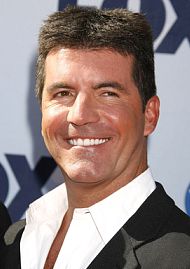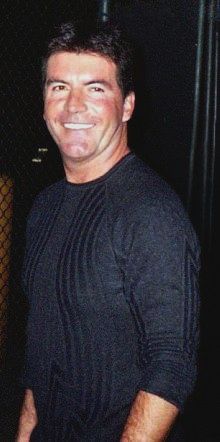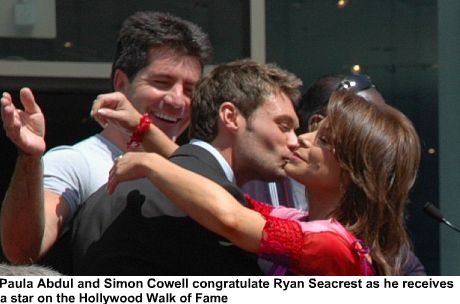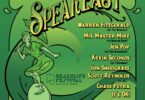
If you were to ask judge Simon Cowell, however, he’d probably insist that anger and jealousy were undoubtedly two stronger emotions felt by the young singers. This is a man, after all, who scoffs at the idea that the contestants could possibly be friends.
“They should hate every contestant and hope that they’re going to screw it up every week,” he stated in the December 2007 issue of GQ magazine. “They’re praying for it, I’m sure of it.”
Cowell himself has declared he hates when other people are successful.
“I think we’re all truthfully like that. Which is, it’s hard enough when someone you don’t know is successful; when it’s someone you do know, it’s twenty times worse,” he told Jay Leno on The Tonight Show in January 2008.
So when I spoke with Cowell after the March 26th elimination show, I couldn’t help but ask why he seemed to be so happy about Paula Abdul’s recent success with her single [“Dance Like There’s No Tomorrow”] considering some of his previous statements.
Cowell smiles, showing off his gleaming white teeth, and clarifies the statement. “I don’t like people having more success than me.”
I press on. “So if Paula’s CD was to suddenly do better than Leona’s [Lewis, Cowell’s newest artist whose album Spirit debuted at #1 in the UK and is set for release in the U.S. on April 8th,] ….”
“It won’t,” he states assuredly.
He Speaks The Truth
I find myself impressed with his candor. His confidence, along with his wit, is alluring. His British charm is magnetic.
But most importantly, his feelings of competitiveness begin to make sense. It might be easy to think of him as a cynic, as one who’s far removed from the American way of congratulating your competitors, but surely he can’t be that different from anyone else who’s ever wanted to be the one to win that promotion or secure that job?
I think back to any role I’ve ever auditioned for or any contest I’ve ever competed in, and not once have I wanted anything other than to win, regardless of who I was competing against, friend or not.
Have any of us, after all, ever fantasized coming in second place at anything?
So Cowell’s feelings don’t make his statements newsworthy, but rather the blunt and honest way he declares that desire for success.
Not unlike when he judges singers, he only says what most of us feel but are too afraid – or simply too reserved – to admit out loud.
Is this the reason why so many seem to relate to the music mogul, agreeing with him rather than despising him?
Why shouldn’t he be proud and confident of Lewis’ success, for instance? He did, after all, have a big hand in it. Why would he be happy if someone – even a friend – suddenly topped her? After mentoring Lewis on The X Factor in the United Kingdom, she was announced winner in December 2006 and has since catapulted to success with the fastest-selling debut album in the U.K., as well as the biggest selling single in the U.K. in 2007 with “Bleeding Love.”
In fact, on the day I spoke with Cowell, “Bleeding Love” had just made its way to #1 on the Billboard Hot 100 in the U.S., the first time in twenty-one years a solo British female vocalist has accomplished the feat, though I was not aware of this news when we spoke. But once again, Cowell’s confidence was already justified.
American Idol Live
Minutes before show time on March 26th, the studio erupts in cheers as his co-judges Paula Abdul and Randy Jackson walk in, and though some might think it fun to boo him, only thunderous applause is heard in the studio at the mere mention of Simon Cowell’s name.
Making his way to his seat, Cowell comes across powerful – and devilishly handsome in a white button-down shirt – yet still friendly and charming as he shakes hands and greets the enthusiastic crowd of fans, some of whom hold signs to support, not a contestant, but Cowell himself.
It’s clear that his popularity has transcended what he could have hoped for six years ago when American Idol first hit television sets across America.
His honesty and brutal criticism towards aspiring superstars quickly made him a household name, though some of those biting comments also earned him not-so-nice nicknames, including “Mr. Nasty” and “Judge Dread.”

When the show premiered in the summer of 2002, Simon Cowell wasn’t a name known to most Americans. Most of us weren’t aware of his background of starting in the mailroom of EMI Records, where he worked his way up to eventually becoming a top A&R guy for Sony BMG, overcoming many obstacles – including bankruptcy – along the way.
We weren’t aware of his track record for discovering talent or his immense success behind the scenes in the music industry, nor were we aware of the splash this man had already made around the United Kingdom, where Pop Idol debuted, preceding American Idol.
Jaws collectively dropped around the country at the words “you have one of the worst voices I have ever heard” or “you are a loser.”
Just who was this man who thought he had the right to tell young adults, teenagers even, that they had no talent?
And better yet, why was he not thrown off TV?
No one was more shocked at the latter than Cowell himself, who has since admitted that he never thought he’d make it past one week on the air. But soon it became clear that Cowell wasn’t being gratuitously rude or cruel, but rather, just honest.
In fact, speaking to Cowell, it’s easy to see that he’s anything but rude off camera. After asking him informally, he graciously granted me an interview, without hesitation.
The Real Simon Cowell
He doesn’t seem too bothered to answer questions, regardless of how many times he may have been asked already. He’s patient and humorous, as long as you’re not singing for him, anyway.
The first question on my mind was what he considers to be the biggest secret to his success.
Instantly, he acknowledges that it must be that he’s never been politically correct and hasn’t ever believed in patronizing anyone.
As a successful A&R man, that may not have been unusual, but as a judge on a TV talent competition, it was that side of him that did shock America, though it quickly turned into a winning formula.
Audiences couldn’t help but tune in to see what Cowell would say next. It quickly became apparent that it was Cowell’s candor – no matter how politically incorrect – that audiences appreciated and craved more of.
When I ask what inspires him, he states easily, “Winning. At everything.” What scares him? “Losing.”
He uses board games as an example of winning, citing Monopoly and admitting that he gets extremely competitive while playing, enough so that he’ll actually tip the board, or if he’s the banker, he might even steal the money.
Granted, he’s only talking about a game here – and it seems he’d actually be quite amusing to play a game with – but it is those same feelings of competitiveness that have earned Cowell a spot at the top of the music and television industries alike.
It is that competitive spirit that lead to Cowell securing sales of more than 150 million records and 70 #1 singles, while also earning the #3 spot on Forbes’ list of TV’s Top Earners.
It is that competitive edge that has helped him create, produce or star in three successful shows on three different networks in the U.S. (Fox’s American Idol, NBC’s America’s Got Talent and ABC’s American Inventor), while also creating, producing and starring in two hit shows in the U.K. (The X Factor and Britain’s Got Talent).
It is that spirit that’s on display every week when he bickers with Idol co-judges Paula Abdul and Randy Jackson or with host Ryan Seacrest, as they each continuously compete to prove they’re right or to get in the last word.
Competing or not, it’s undoubtedly a formula that works, as the four of them share a chemistry that has helped set American Idol apart from any other talent show you might see on T.V.
The relationships between the foursome can’t be faked or forced; the laughs are as real as the arguments, and despite the tension that may arise on occasion, off-camera it’s easy to see the tight bond they share.
Commercial breaks of the live show are filled with the judges and host sharing a laugh and teasing each other, and Cowell, Abdul and Jackson continue to talk amongst themselves even when the cameras are rolling and contestants are on stage.
While they take the competition seriously and hope for a deserving winner each year, they wisely seem to avoid the trap of taking themselves too seriously.
When I ask Cowell to name his favorite thing about Abdul, Seacrest and Jackson, he quips, “That’s a hard question.”
He does finally admit that Jackson is “very funny” and jokes that Seacrest “isn’t as good as me.”
And Abdul? Though their relationship seems to be the most complicated one on the Idol set, Cowell fesses up that his favorite thing about her is her unpredictability. “I like unpredictability,” he admits.
Since Cowell seems up for the hard questions, I delve deeper. What would his longtime girlfriend, Terri Seymour, correspondent for the entertainment news show Extra, say are his best and worst traits?
Cowell confesses that his worst trait is probably that he’s not very affectionate.
He isn’t one to enjoy sappy holidays such as Valentine’s Day. He doesn’t enjoy the obligatory romantic dinner or buying the requisite gifts to prove his feelings, it’s just not who he is. He’d much rather surprise someone with a gift for no reason, perhaps realizing it’s more meaningful that way.
And what would Seymour say is Cowell’s best trait? Probably that he’s generous, in every way, he tells me.
Ironic? Not when I think back to a few minutes earlier, watching him interact with his co-workers, with fans and even consoling contestant Chikezie, who had just been voted off. Once again, Cowell’s dual nature makes sense.
The harsh truths Cowell delivers on camera represent his personal competitiveness and ambitious nature. Knowing first-hand what it takes to achieve massive success in the music industry, he pushes contestants to strive for greatness rather than settle for complacency or mediocrity.
Off camera, he could not be more generous. I can personally attest. I exchanged a few words with Cowell during a commercial break of Idol, telling him I would love to ask him a few questions one day. Cowell immediately invited my companions and me backstage to do just that after the show.
Hopefully he won’t mind me letting the secret out of the bag: “Judge Dread” is actually a very nice guy.








